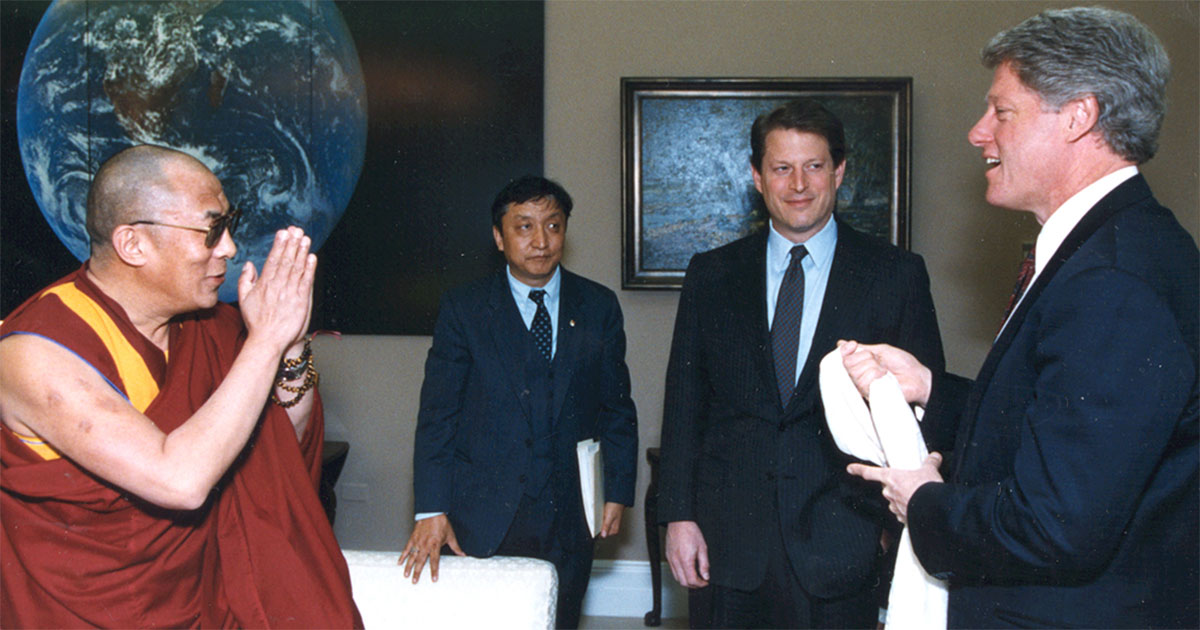As Lodi Gyari retires from the International Campaign for Tibet he has written down his personal reflections on his time in Washington, DC. and at ICT. We are pleased to share with you an excerpt from the introduction. The full report will be published on ICT’s website early in the next weeks.

His Holiness the Dalai Lama meets with President Clinton and Vice President Gore with Lodi Gyari.
It is with humility and gratitude that I present these parting thoughts to the staff, members, supporters and friends of the International Campaign for Tibet (ICT). You have been the backbone of this organization and ICT would not have succeeded without you being a part of this effort. For almost 25 years I worked concurrently at ICT and as Special Envoy for His Holiness the Dalai Lama, and I relied heavily on your support and assistance in discharge of my duties.
Since it’s founding in 1988 the ICT team has devoted itself to supporting the Tibetan people and the vision of His Holiness the Dalai Lama. I am honored to have played a leadership role in this endeavor, from the inception of the organization to the present day. Now as I step down as Executive Chair of ICT and from its Board of Directors, I cannot help but reflect on my work here with a deep sense of satisfaction in our accomplishments.
When ICT first opened, the United States had no positive coherent policy toward Tibet or His Holiness the Dalai Lama, and it provided no humanitarian or development assistance to the Tibetan people. Today, not only is His Holiness welcomed to the White House with respect when he visits Washington, DC, but the U.S. Congress has awarded him their highest civilian honor — the Congressional Gold Medal. And it has passed historic, comprehensive Tibet legislation, the Tibetan Policy Act, as well as allocated an estimated $225 million for Tibet related programs and projects.
Our work in Washington has impacted the course of history for the Tibetan people by providing unprecedented support for their situation and by bringing their plight to the forefront of the world’s stage. The suffering and perseverance embodied in the Tibetan people’s recent history has moved some of the most powerful people in the world, enriching their understanding of the strength of the human spirit. Bringing these experiences to the attention of influential policy makers and being a part of developing a coherent, international response has brought me great professional satisfaction and personal joy.
During a recent visit to London, the President of the Tibetan Community in Britain, Tsering Passang, asked me to share the recipe for my success in advocating for the Tibet cause at an international level. As I said then, it is three-fold. First, I have a passionate belief in the cause of the Tibetan people and an unwavering commitment to serve under the leadership of His Holiness the Dalai Lama. Second, I have sought out colleagues and associates who are wiser and more capable than myself– individuals who are willing to think creatively and not simply agree with everything I say. The team we assembled has brought unparalleled intelligence, talent and commitment to our efforts, and through vigorous intellectual discourse they have contributed unique insights and perspectives to our cause. Finally, I have never been afraid to seek help, and I have been able to establish relationships of trust with people who have the power to assist us in our efforts. I have been fortunate to receive guidance from some of the world’s greatest leaders, officials and scholars of our time, whether it is in India, the United States or elsewhere.
Thus, our success in Washington is not mine alone to celebrate; it is the success of a devoted and committed team. And it is this success that I want to reflect on in this brief report.

